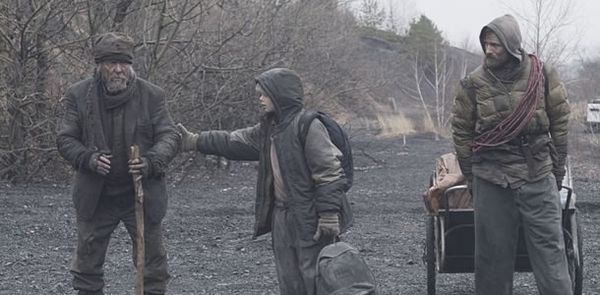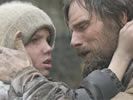Eye For Film >> Movies >> The Road (2009) Film Review
The Road
Reviewed by: Anton Bitel

About a third of the way through Cormac McCarthy's 2006 novel The Road, the two main characters cautiously watch a passing caravan, with colourfully decorated warriors in the front, then harnessed slaves pulling carts piled with the material spoils of war, then the women, and lastly a 'supplementary consort' of yoked catamites.
This is one of only a very few episodes from the Pulitzer Prize-winning book that has not found its way into Joe Penhall's otherwise faithful screen adaptation, and the reason is obvious. On the page, this wagon train is positively terrifying, but on screen it would bring McCarthy's post-apocalyptic vision a little too close to the well-charted (and now cheesy) territories of Mad Max. John Hillcoat's The Road, you see, is pure, stripped-down bleakness, both in the desaturated drabness of its appearance and in the last-days essentialism of its themes. This is an America that has become no country for men or women of any age, and certainly no place for the leather-bound heroics of a Road Warrior.

After an undefined event (nuclear assault? cosmic collision? environmental catastrophe? it hardly matters any more), the sky has turned ash-grey, animals and plants have died, the cities have burned down, and in a desperate scramble for ever dwindling supplies of food and fuel, human survivors have turned on themselves.
Through this desolate landscape, a man (Viggo Mortensen) and his son (Kodi Smit-McPhee) flee the increasing cold of the north and their memories of the boy's now dead mother (Charlize Theron) for whatever might await them at the coast. Pushing their few belongings in a shopping cart, sleeping rough, scavenging for anything edible, and trying to avoid danger (be it earthquakes or other travelers), the duo seeks the end of the road while bearing grim witness to the end of days – and yet, in their struggles and suffering, in their dreams of the past and fears for the future, in their harrowing decisions and occasional acts of kindness, and in their abiding love for one another whatever happens, they also come to define, recognise and maintain their own fragile humanity, 'carrying the fire' where there is otherwise nothing but darkness all about.
Cinema often pairs fathers and sons in extremis to test (or at least dramatise) notions of identity and heritage – just think Lone Wolf and Cub in the Babycart series, Darth Vader and Luke Skywalker in the original Star Wars trilogy, Michael Sullivan and Michael Sullivan Jr in Road To Perdition or Romulus and Raimond (also played by Smit McPhee) in Romulus, My Father. In The Road, however, the father and son do not even get the specificity of names. They are cyphers for all our hopes and anxieties, traveling the long genetic/historic road to nowhere.
A key moment comes when Man and Boy are shown sitting side by side on the sand, staring out to sea, and the boy asks: "What's on the other side?" In the world Hillcoat has realised with such beautiful, awful spareness, everything (including the boy's question) comes to resonate with a metaphysical, even theological quality. The boy seems to be reflecting upon not only the unseen lands across the Atlantic, but also a different kind of beyond where he hopes one day to be reunited with his mother. Of course, as the two sit on the beach contemplating the unknown eternity before them, they are also staring out at us in the cinema, leaving us to ponder how similar a road we all travel, measured in love and loss, hope and despair, faith and suspicion, civilisation and bestiality - and ending, for each and every one of us, in exactly the same place.
Reviewed on: 17 Oct 2009

















